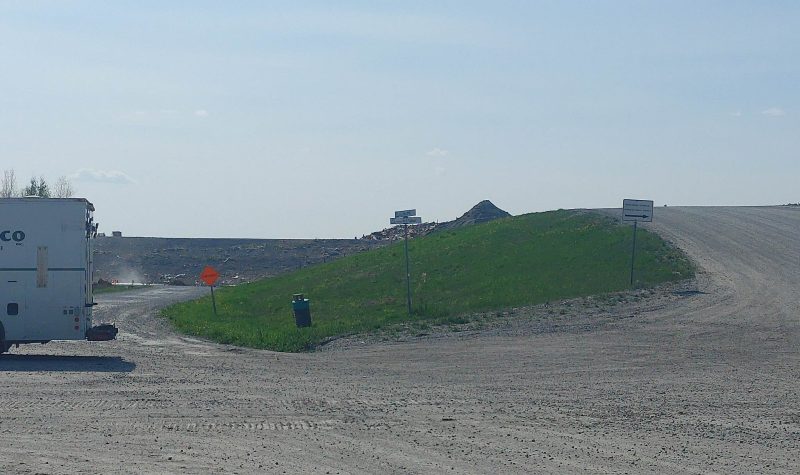la Régie intermunicipale de gestion des matières résiduelles de Brome-Missisquoi (RIGMRBM) has announced the launch of three new projects to continue its mission in promoting eco-responsible habits for waste management in Brome-Missisquoi. It also has a new commercial name.
The announcement comes as the Quebec government begins to roll-out its plan (2022-2031) for a modernized selective collection system, which will see a change in the products and materials that Quebecers can put in the garbage, recycling, and compost.
Now known as Zone-Éco, the former RIGMRBM is a municipal organization that operates the regional landfill and composting platform for Brome-Missisquoi and it is responsible for the environmental control of these spaces. Zone-Éco also oversees the regional ecocentre - a facility that dates back to 2020 - and its reuse space that was added last year.
David Rumsby, general manager of Zone-Éco, said that the group is currently working on a bio gas recovery project, expanding its composting platform, and adding a space reserved specifically for construction, demolition, and renovation materials. While these projects have their differences, together they play an important role in supporting the continuous efforts of Zone-Éco to divert waste from the landfill and to reduce the environmental impacts this waste has on the environment.
“Zone-Éco is a municipal organization so we are attentive as to what is going on in the region, the different changes that are happening in our area. We want to be proactive in the development of responsible waste management and the impact it can have on the environment,” explained Rumsby. “(…) As much as we are proud of the job that we do here, - we’re very good at protecting the environment while landfilling - it’s not our priority to landfill. It’s really to properly manage the waste through the available [avenues] that exist.”
As of right now, the life expectancy of the region’s landfill is estimated to be 22 years, according to Rumsby, and any effort will make a difference in ensuring that the landfill can serve Brome-Missisquoi for as long as possible. He explained that the organic matter that is building up in the landfill also presents a concern for the amount of methane that is being put out into the atmosphere.
“If the waste is reduced significantly, it will help increase the lifespan of the landfill. A lot of it also has to do with creating less methane and that’s one of the reasons why we are so pro-active in wanting to optimize the organic material going onto the compost platform and not into the landfill,” Rumsby highlighted. “The more we landfill organic material, the more methane gas will be created, which is twenty-times more destructive for the atmosphere than carbon dioxide. By diverting that organic waste directly to the compost platform, there are direct impacts that we can have on the carbon emissions of Brome-Missisquoi. It’s the same thing for the construction materials. Wood is organic so it will biodegrade and create additional methane that needs to be controlled.”
There isn’t large-scale participation for Brome-Missisquoi’s commerces, institutions, and some industries for composting, according to Rumsby, but Zone-Éco wants to facilitate - and be equipped- for this participation through the expansion of its compost platform.
“We’re looking at expanding the compost platform for that reason, to go get the organize waste that we haven’t been able to get just yet. As far as the construction and renovation materials, about 35 percent to 40 percent of the waste that’s being is being landfilled today is construction material from different job sites in the region,” he noted. “We want to go get any wood, any steel, any material that could be recycled essentially instead of being in the landfill to try and give it a second purpose.”
To compliment these projects and to further limit the region’s environmental footprint, Zone-Éco is gearing up to launch a biogas project at the end of this year.
“Instead of burning all of the gas that is emitted from the landfill, it’s all going to be injected into natural gas lines. We won’t be emitting carbon dioxide anymore in the atmosphere, it will really be used as renewable gas,” explained Rumsby.
As Zone-Éco begins to implement these projects, Rumsby hopes that the public will “have the confidence that their waste is being sent into better avenues than just directly in the landfill” and begin to develop more eco-responsible habits when managing their waste.
“It’s an ongoing effort and we want to make sure that people feel welcome to talk to us and to ask us their questions. (…) Every small action that people do counts. Sometimes people might not realize that their paint cans don’t go in the garbage. The impact it has on the site, on the cost of landfilling, and on the environmental quality is more important than they realize,” he emphasized. “Every small action that everybody does counts on a large scale.”
Listen to the full interview with David Rumsby below:


